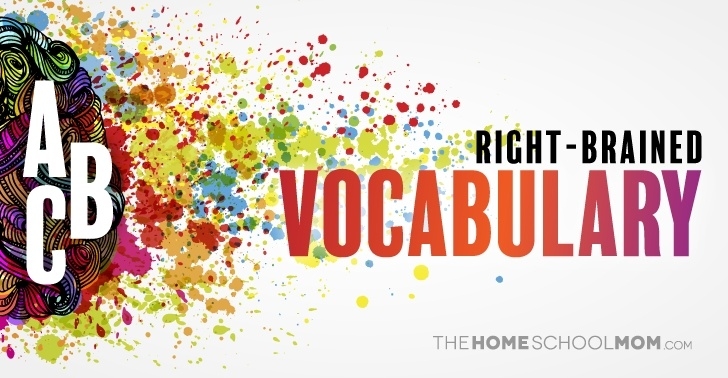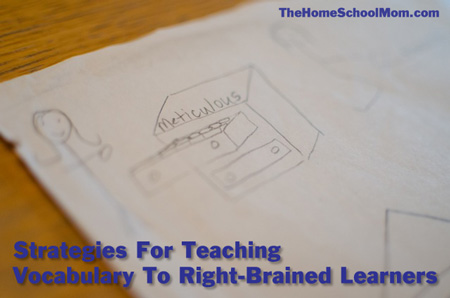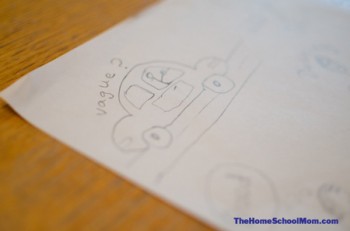It takes some creativity to teach right-brain oriented children effectively.
These holistic, creative thinkers can keep us on our toes to find the best means to help them learn and remember. Intuitive, contextual, and visual, right-brain oriented learners often have difficulty learning concepts that are word-oriented, logical, and detailed. Therefore, like Reading and Math, vocabulary words can pose a challenge for right-brain oriented kids - especially when the traditional method of looking them up in the dictionary is used.

We needed some right-brain oriented strategies in our household for learning vocabulary. Writing down definitions, reviewing words and their meanings multiple times, using words in context and other traditional techniques were falling sadly short in helping my daughter remember new vocabulary words. So I found some inspiration in an unusual source - ideas for helping right-brain oriented students with multiplication!
The logical, sequential process of multiplication is often challenging for right-brain oriented kids. One of the most effective means for helping these students memorize multiplication facts is through the use of illustrated story cards. These cards use story and pictures to make multiplication facts visual for students, which helps the facts to "stick" in right-brain oriented kids' memories.
If pictures and stories work for multiplication, why not for vocabulary?

I am not an artist. But, I've discovered, my kids don't care. In fact, they laugh at my crazy drawings, and the funnier they look, the more invested my children become in paying attention. I try to create stories that my kids will connect with, so often the subject matter is centered around things we experience in our lives. For example, my girls know that I'm terrible with directions and have been known to easily get lost (something, by the way, that my right-brain oriented daughter never has trouble with), so our story/picture for the word "vague" involved a woman driving a car, with a question mark over her head, after getting lost from trying to follow her husband's "vague" directions.
Ask my daughter, at any time, what "vague" means, and she can tell you.
We now do all of our vocabulary this way, and the meanings of the words are never forgotten! It takes a bit more time and effort to draw and concoct a story for each word, but not, I've discovered, nearly as much time as reviewing and re-reviewing and re-re-reviewing the same vocabulary words multiple times after simply looking up the definitions, because my daughter can't remember what they mean. And, interestingly, vocabulary time has become one of her favorite parts of school.
So if you're struggling to teach vocabulary, and your child just will not seem to remember what the words mean, no matter how many times you go over them - change techniques. That's why we homeschool anyway, remember? To be able to individualize our teaching to our children's needs. Pull out the paper and drawing materials and start getting creative with your vocabulary words! You might even find that your child will not only learn his or her vocabulary, but will enjoy school just a little bit more.
That, for me, would be the definition to the word "Win-win".





 Rebecca Capuano holds a Master of Social Work degree from East Carolina University and is the stay-at-home mom of three children (one of whom is in heaven). She also makes attempts at being a homeschooler, writer, photographer, scrapbooker, and truth-seeker. She has worked in a variety of capacities (including group homes, day treatment centers, and public schools) with at-risk children and staff, including developing a therapeutic and educational day treatment center for delinquent youth in Wilmington, North Carolina. She currently resides in Virginia. Rebecca believes that family is created by God as the most fundamental institution in society, and she is dedicated to helping families nurture their children to become responsible persons of character and integrity.
Rebecca Capuano holds a Master of Social Work degree from East Carolina University and is the stay-at-home mom of three children (one of whom is in heaven). She also makes attempts at being a homeschooler, writer, photographer, scrapbooker, and truth-seeker. She has worked in a variety of capacities (including group homes, day treatment centers, and public schools) with at-risk children and staff, including developing a therapeutic and educational day treatment center for delinquent youth in Wilmington, North Carolina. She currently resides in Virginia. Rebecca believes that family is created by God as the most fundamental institution in society, and she is dedicated to helping families nurture their children to become responsible persons of character and integrity.
Leave a Reply